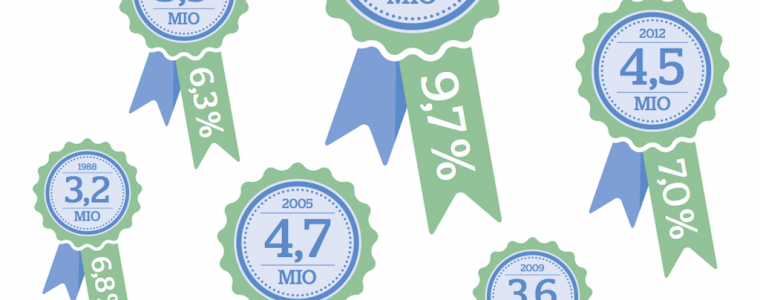795 Euro monatlich braucht ein Rentner in Deutschland zum Überleben. Das ist der durchschnittliche Alters-Grundsicherungsbedarf, den das Bundesamt für Arbeit und Soziales ermittelt hat. Das Problem: Weniger als die Hälfte der Deutschen können mit ihren heutigen Jobs eine Rentenausschüttung dieses Betrags – geschweige denn eines höheren – überhaupt erwirtschaften.
SZ: die meisten Deutschen besitzen weniger als andere Europäer
Die meisten Bundesbürger besitzen deutlich weniger als andere Europäer. Das geht aus einer Studie der europäischen Zentralbank (EZB) hervor. Danach sammelt der mittlere deutsche Haushalt ein Nettovermögen von 60 000 Euro an, die Bürger im Schnitt von 18 Euro-Staaten dagegen mehr als 100 000 Euro. Weil das mittlere Vermögen unter anderem in allen Euro-Krisenstaaten höher ausfällt als in Deutschland, könnten die Ergebnisse vor der Bundestagswahl 2017 scharfe Kontroversen auslösen.
FAZ: Überraschungen im Depot der Deutschen
Wie legen die Deutschen ihr Geld an? Meist gibt es darüber nur recht blutleere Statistiken. Jetzt hat die ING Diba einen Blick in die Depots ihrer Kunden geworfen – und die Ergebnisse der F.A.Z. vorgestellt.
FAZ: Aktien lohnen dauerhaft
Das Anlageverhalten der Deutschen ist arg schüchtern und könnte ein bisschen Aufmunterung vertragen. Aktien lohnen sich, wenn man eine einfache Regel beachtet: Augen zu und durch – Aussitzen ist Trumpf.
FAZ: Gewinne mit alten Fonds werden ab 2018 steuerpflichtig
Die Besteuerung von Fonds ändert sich ab 2018 radikal. Wer vor 2009 in Indexfonds investierte, verliert den Bestandsschutz. Aktien behalten vorerst den Steuervorteil.
FAZ: ETF kaufen, aber richtig!
Mit Indexfonds kann man nichts falsch machen, heißt es. Doch Übermut und Gier machen den Erfolg kaputt. Entscheidend ist, was nach dem Kauf getan wird.
Study by S&P Dow Jones Indices found that 99% of US equity funds underperformed over 10 years
100% of the actively managed equity funds sold in the Netherlands failed to beat their benchmark over the last 5 years
86% of the actively managed equity funds in Europe failed to bear their benchmark over the last 10 years
98.9% of the US equity funds underperformed over the last 10 years
97% of the emerging market funds underperformed over the last 10 years
98% of the global equity funds underperformed over the last 10 years
I won’t get much more than €1200 when I retire, and nor will most of you
Every year in the spring, I get post from the „Deutsche Rentenversicherung Bund“, providing information about my future state pension. What the letter says is scary.
First of all, it reminds me that I will have to work until 2037 (I will be 67 by then) to get my full pension. OK, I like working, but can I really trust the state that 2037 stays 2037, and doesn’t become 2040 (I will then be 70), or 2045 (I will then be 75)? Hardly, because there is still plenty of time for future governments to change the rules of the game until then.
And they will! The German population is stagnating, and getting older and older (the current median age is 47, i.e. 50% of the population is older than 47…). So there will be more pensioners, and fewer people in work. So the state won’t be able to keep its promise: pensions are paid by people in work, nobody else.


